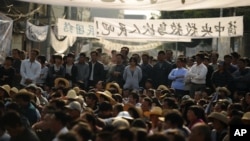Villagers embroiled in a land dispute in southern China have managed to do what so many others have not: force the Chinese Communist Party out of their neighborhood. At least for a while. This has many wondering if Wukan is the epicenter of China's own "Arab Spring," or just another "incident" like the tens of thousands of village protests that came before it.
Residents of the Guangdong province fishing village became incensed last September when they learned of plans by a local company to sell farmland to Country Garden, one of China's biggest property developers. They accused local officials of corruption, raided the government offices and clashed with police. The local party boss fled Wukan, and the people began demanding negotiations with higher authorities.
The police had a different idea. They seized the village mediators and tried unsuccessfully to regain control of Wukan last week. But when police retreated, what some villagers considered a victory turned into a deadly standoff. One protest leader died in police custody and the entire village is still blockaded.
Many Wukan residents suspect the activist died from police abuse. Chinese state media have quoted local officials and doctors saying he suffered heart failure.
Malcolm Moore, a reporter with Britain's Daily Telegraph newspaper, was one of the few western journalists to slip into Wukan and get the story out at the height of the tensions earlier this week. He said everyone there "collectively lost patience" after the death of their fellow villager.
"The villagers are all gathering together every day between 3 [pm] and 6 pm to chant slogans, to call for justice and to express their anger," he said.
Click to hear the interview with Malcolm Moore:
Moore spoke with Wukan's residents about what they want, and found it isn't mass political reform.
"I think these cases are always about money and they're always about land. It's not part of some wider democracy movement. It's not an attempt to overthrow anyone," he said. "The village has expressed its confidence in the central government. All it's said is that the local government haven't resolved their grievances properly."
Moore left Wukan after two days because of concerns his presence would endanger the protesters. Since then, a stream of both foreign and Chinese journalists have headed for the village, a move he says signals the people's wish for Beijing's intervention might come true.
"The fact that Chinese media are now about to report this story suggests to me that somebody at a higher level has decided this can be resolved peacefully and can be reported on," Moore said.
Wu Zili, the acting mayor of Shanwei county, which oversees Wukan, took a dual approach to try to quell the unrest this week, vowing both to crackdown on its leaders and investigate the officials accused of wrongdoing. He also told state media that one of the land projects involved in the dispute has been frozen.
Close to 200,000 incidents of social unrest flare up across China each year, two-thirds of them stemming from land issues. But few get to the point that Wukan has.
Sophie Richardson, a China expert with Human Rights Watch in Washington, DC, says the revolt shows it's getting much harder for local authorities to keep their problems local. "More people are now aware that by virtue of communications technology, they can effectively leap frog local authorities and take their complaints to more senior levels, whether they're provisional or national," she said.
Since the "Arab Spring" pro-democracy uprisings began sweeping the Middle East and North Africa earlier this year, China has moved to discourage a homegrown "Jasmine Revolution." Authorities have locked up activists and intellectuals, and the central government has placed greater emphasis on cracking down on local-level graft.
Richardson says the national government is still fairly effective in tamping down local flareups by using coercion in some situations, and repression in others. But she says that is only a temporary fix.
"The Chinese government has to choose between letting people take their cases to court and letting them take it out on the street," she said. "And if they don't want a whole lot of 'Wukans,' they have to make the legal system available and fair to everyone, so when local officials do things like this, there is redress."
Until then, the villagers of Wukan are making up the rules in one of the only cities in China where the authority has no authority.












